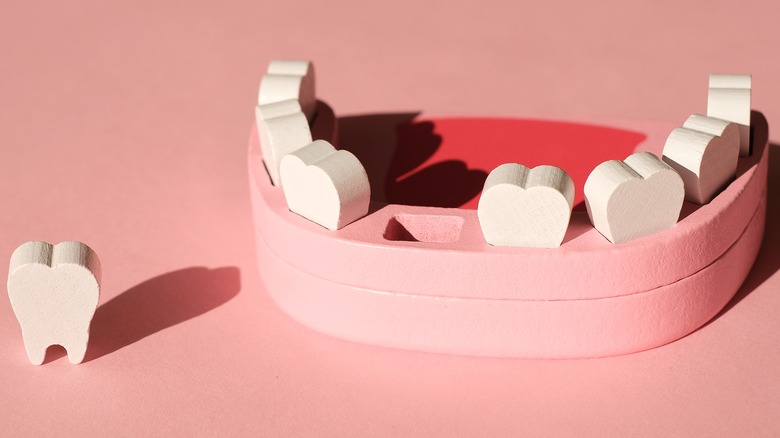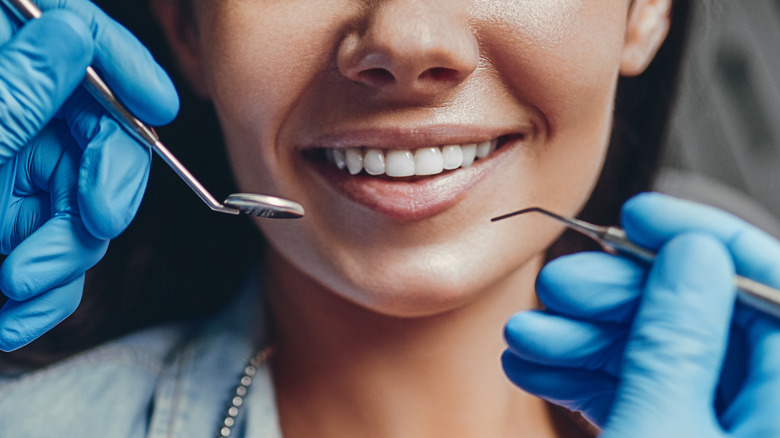Here's What's Really Causing Your Toothache
There you are, just going about your day when you're suddenly struck with a sharp pain on one side of your mouth. Aside from being shocked and a bit confused, pain in and around teeth can often be unbearable. That's because just beyond the hard enamel of our teeth is a soft pulp that makes up the center of the tooth, according to WebMD. This pulp is chock full of some of the most sensitive nerve endings in our bodies.
A toothache may present as a sharp, aching, or throbbing pain in or around a tooth or set of teeth. As a result, you may also experience headaches, sensitivity to hot or cold temperatures, fever, swelling, or a foul odor emanating from the mouth. Some causes of tooth pain may prove to be treatable at home. Others may require the intervention of a dentist, but in order to effectively treat a painful tooth, it is essential to identify the cause of the pain first.
Causes of a toothache
A toothache can be caused by a myriad of things. According to NHS Inform, your tender teeth may be a result of inflamed or infected gums. You might just have a post-movie night popcorn shell stuck in your gums, causing discomfort, or a bigger problem like gingivitis or receding gums could be to blame. Tooth decay can also be the cause. Cavities, which are holes that form in teeth due to enamel erosion, are a common culprit of toothaches.
An abscess (or bacterial infection) inside the tooth could be a cause of pain. When bacteria make their way inside a tooth, a pocket of pus may form and cause severe pain. Because abscesses can be serious, it's important to call your dentist immediately.
Grinding or clenching of the teeth might cause pain as well, as repetitive motions can wear teeth down. A tooth fracture due to injury may be creating your pain if a tooth has broken or cracked, exposing nerves and causing sharp pain. Similarly, a broken filling can cause the same type of pain.
Treating a toothache
Depending on the cause of the toothache, there are many ways to ease the painful symptoms, according to the Cleveland Clinic. Rinsing with warm salt water or a diluted hydrogen peroxide solution can disinfect and reduce inflammation. If opting for saltwater, mix half a teaspoon of salt into warm water and swish. If hydrogen peroxide is more your speed, combine equal parts water and hydrogen peroxide and hold it in your mouth. Be sure not to swallow it.
Over-the-counter medications, like aspirin and ibuprofen, can reduce inflammation and ease discomfort. If you're treating a child, reach for Tylenol instead.
There are many herbal remedies that can help with the causes of a toothache. Clove oil is a natural antiseptic, and when applied directly to the area, it can act as a disinfectant. The alcohol in vanilla extract has a numbing effect on painful gums, and because it's packed with antioxidants, it can be very healing (per Cleveland Clinic).
If you want to reach for the big guns, stop by your local plant/herb store and ask for paracress, also referred to as "the toothache plant," according to Healthline. Chewing on the yellow bulbs can offer fast relief via intense numbing. The "buzz buttons," as they've been affectionately nicknamed, have flavonoids that block pain receptors. The plant's antiseptic and anti-inflammatory properties can also aid in a speedy recovery.
If your toothache progresses after trying some of these at-home options for relief, call your dentist and request an appointment.



